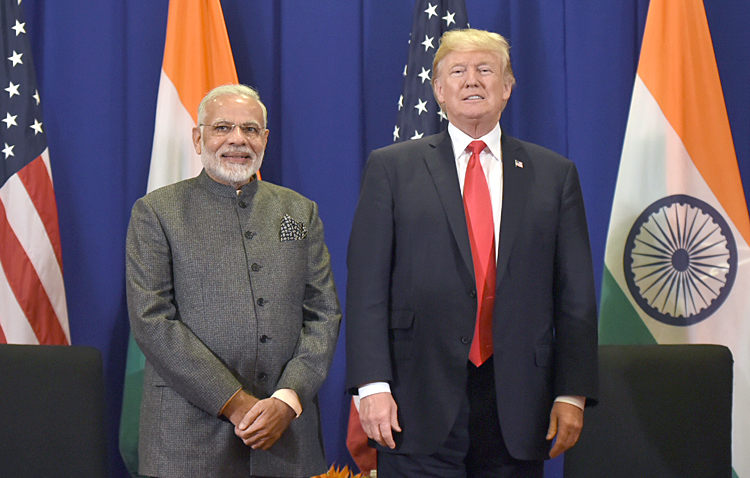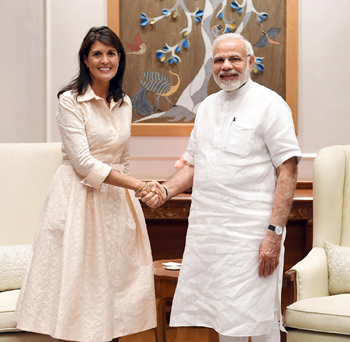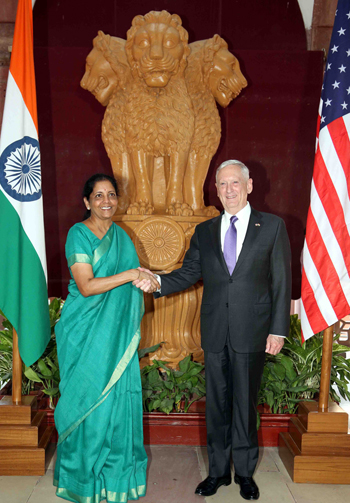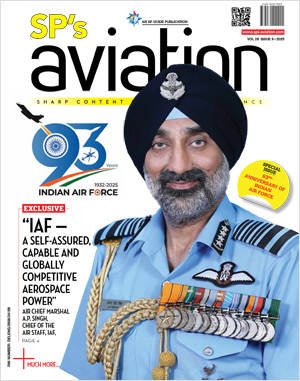INDIAN ARMED FORCES CHIEFS ON OUR RELENTLESS AND FOCUSED PUBLISHING EFFORTS

The insightful articles, inspiring narrations and analytical perspectives presented by the Editorial Team, establish an alluring connect with the reader. My compliments and best wishes to SP Guide Publications.

"Over the past 60 years, the growth of SP Guide Publications has mirrored the rising stature of Indian Navy. Its well-researched and informative magazines on Defence and Aerospace sector have served to shape an educated opinion of our military personnel, policy makers and the public alike. I wish SP's Publication team continued success, fair winds and following seas in all future endeavour!"

Since, its inception in 1964, SP Guide Publications has consistently demonstrated commitment to high-quality journalism in the aerospace and defence sectors, earning a well-deserved reputation as Asia's largest media house in this domain. I wish SP Guide Publications continued success in its pursuit of excellence.
- A leap in Indian aviation: Prime Minister Modi inaugurates Safran's Global MRO Hub in Hyderabad, Calls It a Milestone
- All about HAMMER Smart Precision Guided Weapon in India — “BEL-Safran Collaboration”
- India, Germany deepen defence ties as High Defence Committee charts ambitious plan
- True strategic autonomy will come only when our code is as indigenous as our hardware: Rajnath Singh
- EXCLUSIVE: Manish Kumar Jha speaks with Air Marshal Ashutosh Dixit, Chief of Integrated Defence Staff (CISC) at Headquarters, Integrated Defence Staff (IDS)
- Experts Speak: G20 Summit: A Sign of Global Fracture
Indo-US 2+2 Dialogue – and the trade war
 |
By Lt. General P.C. Katoch (Retd) Former Director General of Information Systems, Indian Army |



The Indo-US 2+2 Dialogue scheduled for July 6, 2018 at Washington DC, for which EAM Sushma Swaraj and RM Nirmala Sitharamn were to travel to Washington DC to hold discussions with US Secretary of State Mike Pompeo and Defence Secretay James Mattis, has been postponed for a second time. Concurrent to the arrival Nikki Haley, US Ambassador to UN visiting India on June 27-28, came a telephone call from Mike Pompeo to Sushma Swaraj expressing "regret and deep disappointment" at the US having to postpone the 2+2 dialogue for "unavoidable reasons". During the phone call, Pompeo reportedly discussed further strengthening the US-India cooperation, asserting that India is "a major priority" for the Trump administration. Both agreed the 2+2 dialogue would be rescheduled as soon as possible at a mutually convenient time and location. Haley's visit to India perhaps also was to soften the disappointment in India over what Pompeo conveyed to Swaraj. What the "unavoidable reasons" are to postpone the 2+2 Dialogue have not been explained by the US albeit it is considered disappointing by US Think Tanks, and a scholar from the Atlantic Council saying, "Like the summit with North Korea, they believe they might be able to advance their relations with Russia, whatever that means in tangible terms.
The US' relations with Russia have deteriorated significantly over the last 18 months and I believe the Trump administration might be able to turn around a corner with one of US's significant adversaries." Commencement of the Indo-US 2+2 Dialogue at ministerial level was decided between PM Modi and President Trump in August last year; White House announced India and US will start a new 2+2 ministerial dialogue to enhance "peace and stability across the Indo-Pacific region, saying, "The leaders resolved to enhance peace and stability across the Indo-Pacific region by establishing a new 2-by-2 ministerial dialogue that will elevate their strategic consultations." The first dialogue was earlier slated to be held on April 18 or 19 this year but got postponed due to change of US Secretary of State; Washington announced postponement in March 2018 citing uncertainty over confirmation of mike Pompeo as new US Secretary of State after President Trump fired Rex Tillerson.
But finally was sheduled for July 6, which again stands postponed indefinitely. But Haley's visit itself was amidst trade war launched by President Trump on China, other countries, including tariffs on Indian goods and India launching reciprocal tariffs from August 4. Under President Trump, US has pulled out from TPP, Paris Accord, Iran Nuclear Deal, imposed sanctions on Russia and Iran, is embroiled in trade war with China, not sparing its allies, as also India – resulting in these countries imposing tariffs on US goods. Proposed US cuts in H-1B professional visas and cancellation of H4 spouse visas have increased tensions. The latest blow has come with US warning India and China to cut oil imports from Iran and no waivers of any sort. With the rupee already crossing 69 vis-à-vis dollar, this will hurt Indian economy, aside from adversely affecting its Chahabar project. At the Trump-Kim summit, Trump suspended US-South Korea joint exercises, leaving US allies speculating US commitment during crisis, also because US appears to have given up on China's claims and militarization of East and South China Seas. US pullout from various deals makes its credibility suspect.
Sanctions on Iran have left European nations fuming, also affecting India's Chabahar project. US officials say India's proposed import of five S-400 Triumf systems ex Russia could be considered major purchase, attracting sanctions under Countering America's Adversaries through Sanctions Act (CAATSA). Recently, the US Senate passed a $716 billion bill on June 19, 2018 seeking enhanced defence ties with India, consequent to US recognizing India as a 'major defence partner' in 2016, which allows India to buy more advanced and sensitive technologies. On June 12, US State Department also cleared sale of six additional AH-64E Apache Attack Helicopters to India costing $930 million, subject to Senate approval. As and when the 2+2 Dialogue takes place, US interests for the discussions possibly would be: cooperation on the high seas and Chinese expansionism in Indo-Pacific region; developments in West Asia, Afghanistan and Korean Peninsula; Pakistan's proxy war in Afghanistan (if at all); defence cooperation with India, and; probing outcomes of Modi_Xi amd Modi-Putin informal meets. Indian interests perhaps would include: China-Pak nexus - CPEC, Gwadar, PLA Base in Skardu, FATA (likely) and Afghanistan – and effect on the region; Pakistani support to LeT, JuD, HuM etc; Chin-Pakistan nexus in fomenting terrorism in J&K and Northeast; need to put Pakistan under sanctions - US aid to Pakistan also be linked to closure of anti-India terrorist camps in POK-Pakistan, not just sanctuaries of Taliban and Haqqanis; comprehensive Indo-US defence deal, not piecemeal; effects of China's debt trap policy in the region; Indo-Russian defence deals to run parallel - attempt to force purchase of US Patriot missile systems could damage strategic partnership, and; countering Islamic State strategy in vulnerable states like Afghanistan, Bangladesh, Myanmar and Maldives.
China's state-sponsored media has been threatening China that a third country (read China) can enter J&K on Pakistan's request. Also that China can destabilize and separate India's northeast, and create instability in Sikkim. While US supports the 'One China' policy, US could also announce support to 'One India' if it accords due importance to the Indo-US Strategic Partnership. This would serve as a signal to the world at large, as well as addressing Pakistan's illegal claim to J&K, 1949 UN Resolution on Kashmir having acknowledged accession of original State of J&K to India. Myanmar too needs detailed discussion, with China lethally arming the United Wa State Army (UWSA) in Myanmar, establishing United Liberation Front of West, South and East Asia, faking support to Myanmar government against Rohingyas and simultaneously supporting the Arakan Rohingya Salvation Army (ARSA) through Pakistan's ISI and the LeT.
In backdrop of the China-Pakistan nexus, US approach of assisting Indian military modernization through "step-by-step approach" is ludicrous and doesn't inspire confidence. Finally, America, Russia and China are developing space weapons and space wars are predicted in coming years. Indo-US cooperation in hi-tech areas of space, cyberspace, robotics, electro-magnetic is very essential. At the same time, with 21st century conflicts being dominated by irregular and asymmetric conflicts, the numerous fault-lines of China and Pakistan must also find place in the dialogue, even as these can't be publicized. On balance despite the trade war, there is considerable potential in the Indo-US Strategic Partnership beyond trade.





